Legal Aspects of Business: Agency Law, Authority, and Case Analysis
VerifiedAdded on 2020/11/23
|10
|3231
|457
Report
AI Summary
This report delves into the legal aspects of business, focusing on the law of agency. It begins with a definition of agency law and explores the duties of an agent, including judiciary, non-fiduciary, and fiduciary responsibilities. A case summary of the Freeman and Lockyer v Buckhurst Park Properties case is provided, highlighting the issues of contractual law and the agency relationship. The report analyzes the different types of authority, particularly actual and apparent authority, and examines relevant case law. The core issue of the case, the defendant's liability to pay the architects, is analyzed, along with a differentiation between actual and apparent authority. The report concludes by summarizing the key concepts and their practical implications within a business context.
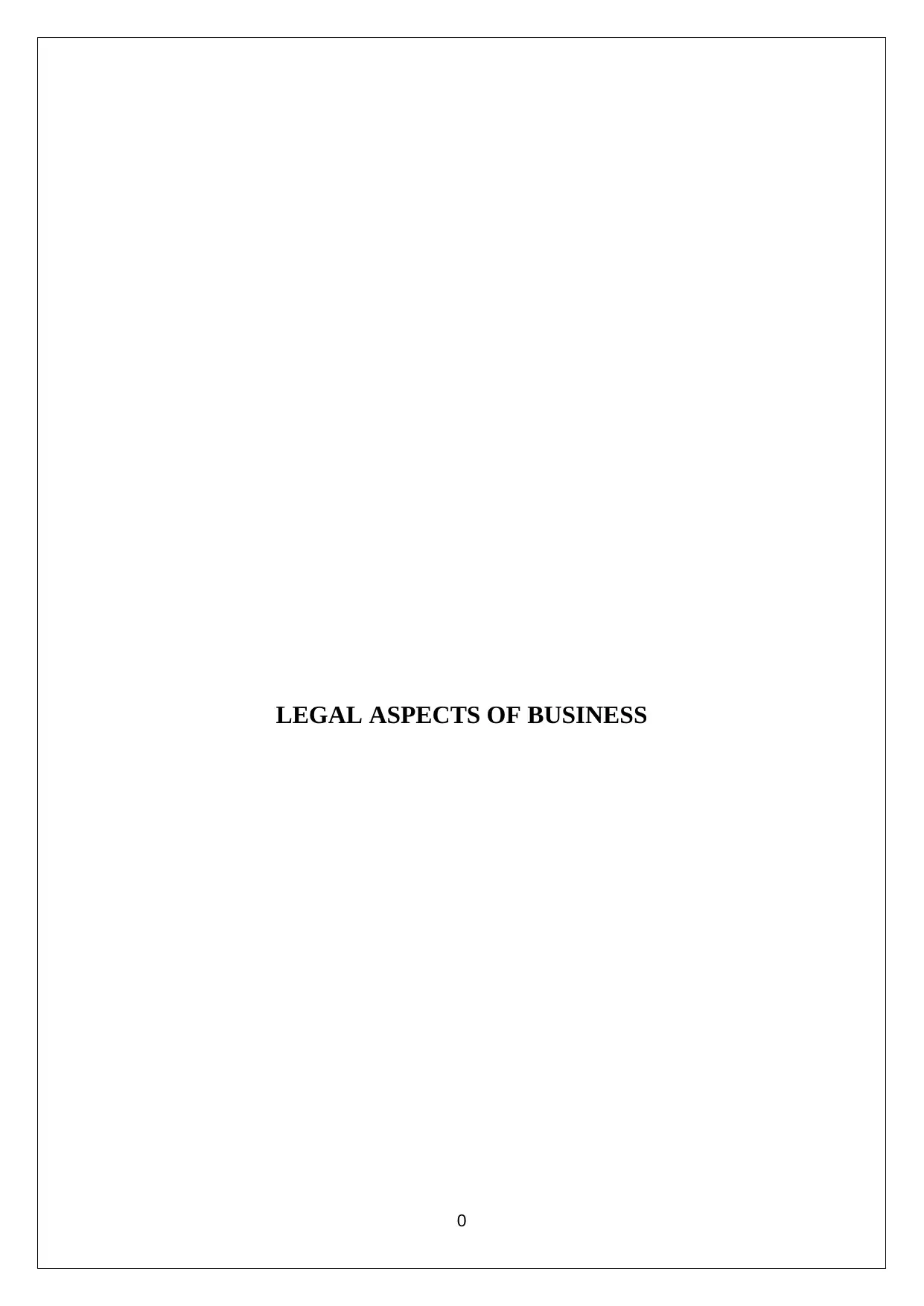
LEGAL ASPECTS OF BUSINESS
0
0
Paraphrase This Document
Need a fresh take? Get an instant paraphrase of this document with our AI Paraphraser
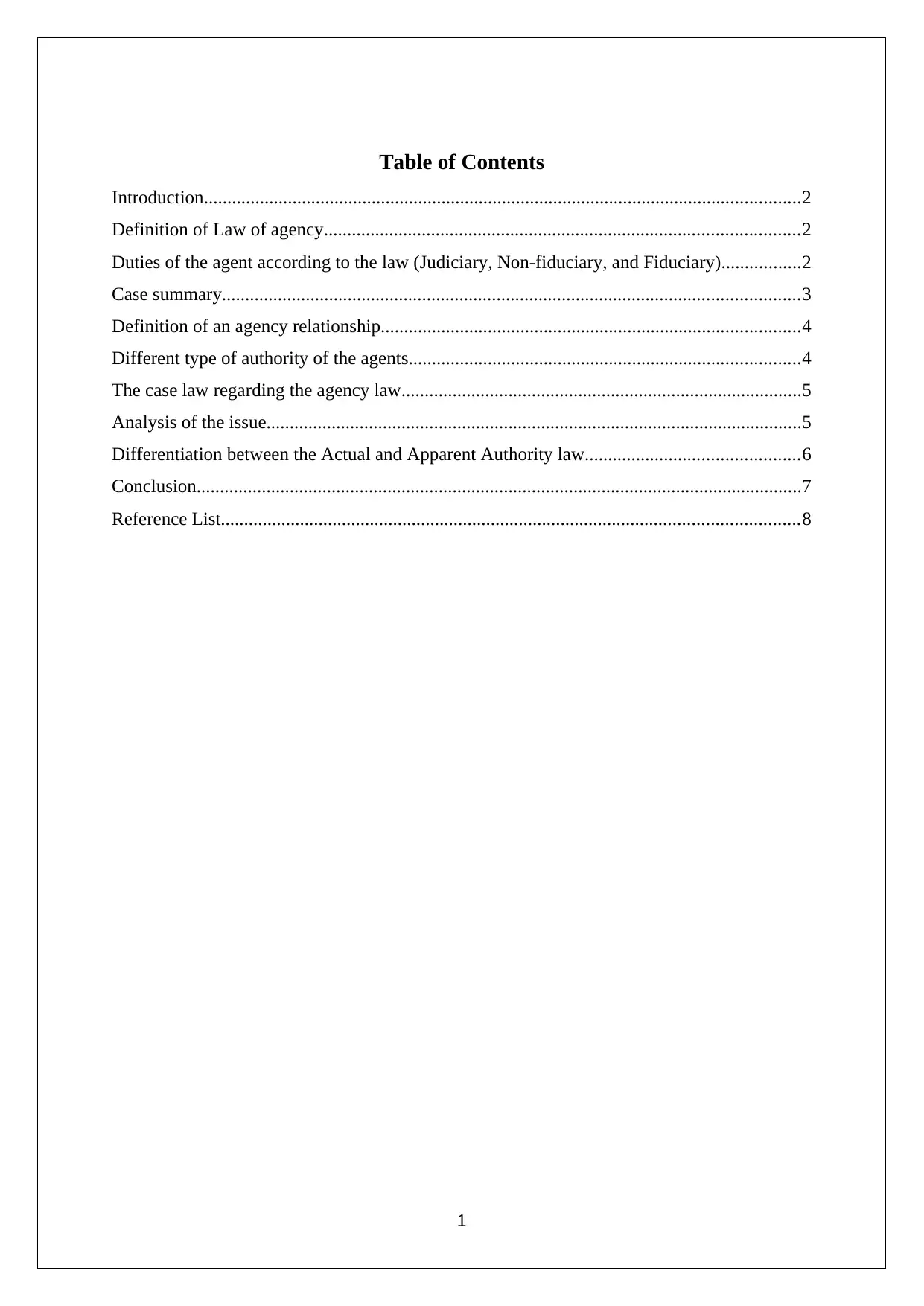
Table of Contents
Introduction................................................................................................................................2
Definition of Law of agency......................................................................................................2
Duties of the agent according to the law (Judiciary, Non-fiduciary, and Fiduciary).................2
Case summary............................................................................................................................3
Definition of an agency relationship..........................................................................................4
Different type of authority of the agents....................................................................................4
The case law regarding the agency law......................................................................................5
Analysis of the issue...................................................................................................................5
Differentiation between the Actual and Apparent Authority law..............................................6
Conclusion..................................................................................................................................7
Reference List............................................................................................................................8
1
Introduction................................................................................................................................2
Definition of Law of agency......................................................................................................2
Duties of the agent according to the law (Judiciary, Non-fiduciary, and Fiduciary).................2
Case summary............................................................................................................................3
Definition of an agency relationship..........................................................................................4
Different type of authority of the agents....................................................................................4
The case law regarding the agency law......................................................................................5
Analysis of the issue...................................................................................................................5
Differentiation between the Actual and Apparent Authority law..............................................6
Conclusion..................................................................................................................................7
Reference List............................................................................................................................8
1
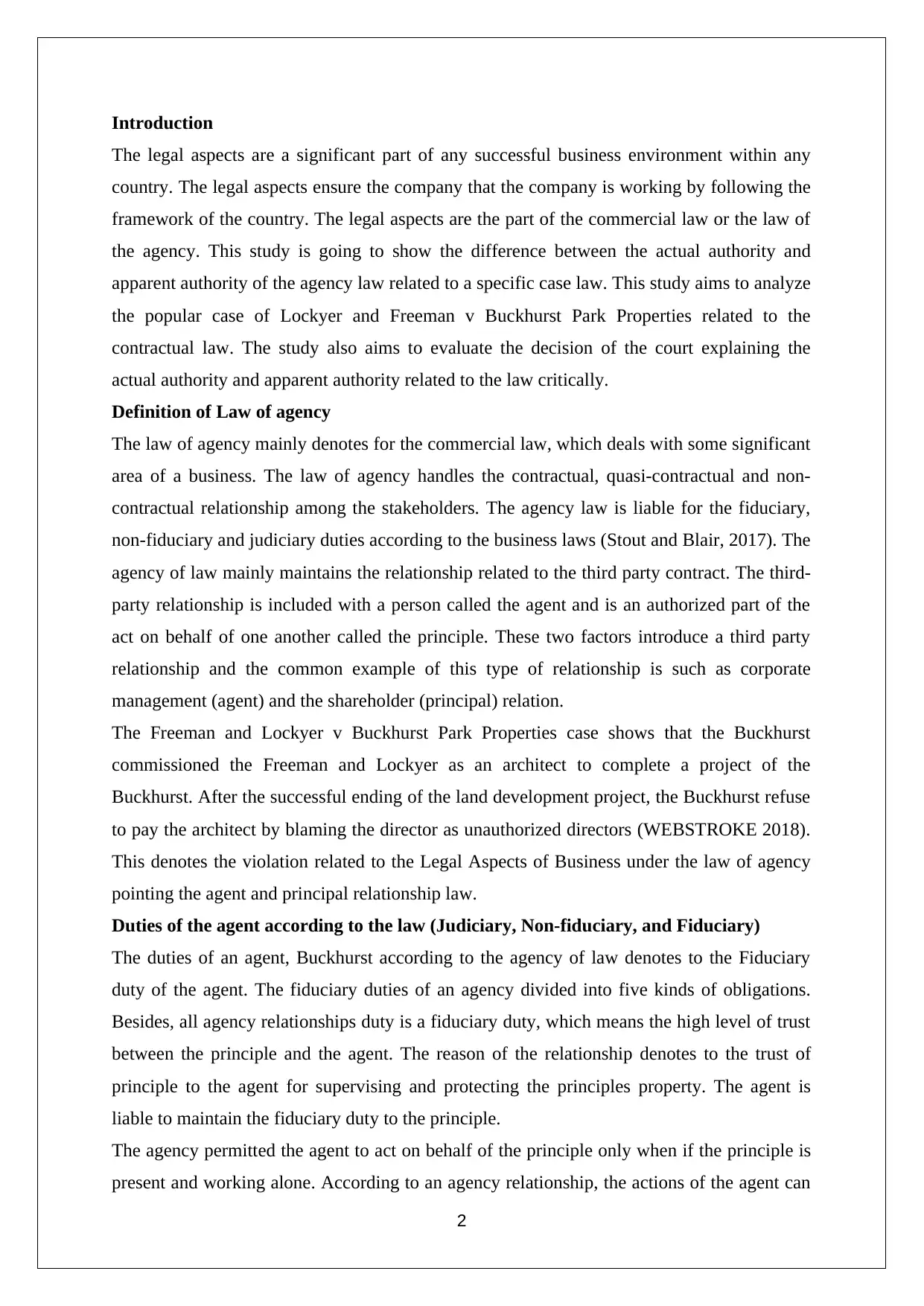
Introduction
The legal aspects are a significant part of any successful business environment within any
country. The legal aspects ensure the company that the company is working by following the
framework of the country. The legal aspects are the part of the commercial law or the law of
the agency. This study is going to show the difference between the actual authority and
apparent authority of the agency law related to a specific case law. This study aims to analyze
the popular case of Lockyer and Freeman v Buckhurst Park Properties related to the
contractual law. The study also aims to evaluate the decision of the court explaining the
actual authority and apparent authority related to the law critically.
Definition of Law of agency
The law of agency mainly denotes for the commercial law, which deals with some significant
area of a business. The law of agency handles the contractual, quasi-contractual and non-
contractual relationship among the stakeholders. The agency law is liable for the fiduciary,
non-fiduciary and judiciary duties according to the business laws (Stout and Blair, 2017). The
agency of law mainly maintains the relationship related to the third party contract. The third-
party relationship is included with a person called the agent and is an authorized part of the
act on behalf of one another called the principle. These two factors introduce a third party
relationship and the common example of this type of relationship is such as corporate
management (agent) and the shareholder (principal) relation.
The Freeman and Lockyer v Buckhurst Park Properties case shows that the Buckhurst
commissioned the Freeman and Lockyer as an architect to complete a project of the
Buckhurst. After the successful ending of the land development project, the Buckhurst refuse
to pay the architect by blaming the director as unauthorized directors (WEBSTROKE 2018).
This denotes the violation related to the Legal Aspects of Business under the law of agency
pointing the agent and principal relationship law.
Duties of the agent according to the law (Judiciary, Non-fiduciary, and Fiduciary)
The duties of an agent, Buckhurst according to the agency of law denotes to the Fiduciary
duty of the agent. The fiduciary duties of an agency divided into five kinds of obligations.
Besides, all agency relationships duty is a fiduciary duty, which means the high level of trust
between the principle and the agent. The reason of the relationship denotes to the trust of
principle to the agent for supervising and protecting the principles property. The agent is
liable to maintain the fiduciary duty to the principle.
The agency permitted the agent to act on behalf of the principle only when if the principle is
present and working alone. According to an agency relationship, the actions of the agent can
2
The legal aspects are a significant part of any successful business environment within any
country. The legal aspects ensure the company that the company is working by following the
framework of the country. The legal aspects are the part of the commercial law or the law of
the agency. This study is going to show the difference between the actual authority and
apparent authority of the agency law related to a specific case law. This study aims to analyze
the popular case of Lockyer and Freeman v Buckhurst Park Properties related to the
contractual law. The study also aims to evaluate the decision of the court explaining the
actual authority and apparent authority related to the law critically.
Definition of Law of agency
The law of agency mainly denotes for the commercial law, which deals with some significant
area of a business. The law of agency handles the contractual, quasi-contractual and non-
contractual relationship among the stakeholders. The agency law is liable for the fiduciary,
non-fiduciary and judiciary duties according to the business laws (Stout and Blair, 2017). The
agency of law mainly maintains the relationship related to the third party contract. The third-
party relationship is included with a person called the agent and is an authorized part of the
act on behalf of one another called the principle. These two factors introduce a third party
relationship and the common example of this type of relationship is such as corporate
management (agent) and the shareholder (principal) relation.
The Freeman and Lockyer v Buckhurst Park Properties case shows that the Buckhurst
commissioned the Freeman and Lockyer as an architect to complete a project of the
Buckhurst. After the successful ending of the land development project, the Buckhurst refuse
to pay the architect by blaming the director as unauthorized directors (WEBSTROKE 2018).
This denotes the violation related to the Legal Aspects of Business under the law of agency
pointing the agent and principal relationship law.
Duties of the agent according to the law (Judiciary, Non-fiduciary, and Fiduciary)
The duties of an agent, Buckhurst according to the agency of law denotes to the Fiduciary
duty of the agent. The fiduciary duties of an agency divided into five kinds of obligations.
Besides, all agency relationships duty is a fiduciary duty, which means the high level of trust
between the principle and the agent. The reason of the relationship denotes to the trust of
principle to the agent for supervising and protecting the principles property. The agent is
liable to maintain the fiduciary duty to the principle.
The agency permitted the agent to act on behalf of the principle only when if the principle is
present and working alone. According to an agency relationship, the actions of the agent can
2
⊘ This is a preview!⊘
Do you want full access?
Subscribe today to unlock all pages.

Trusted by 1+ million students worldwide
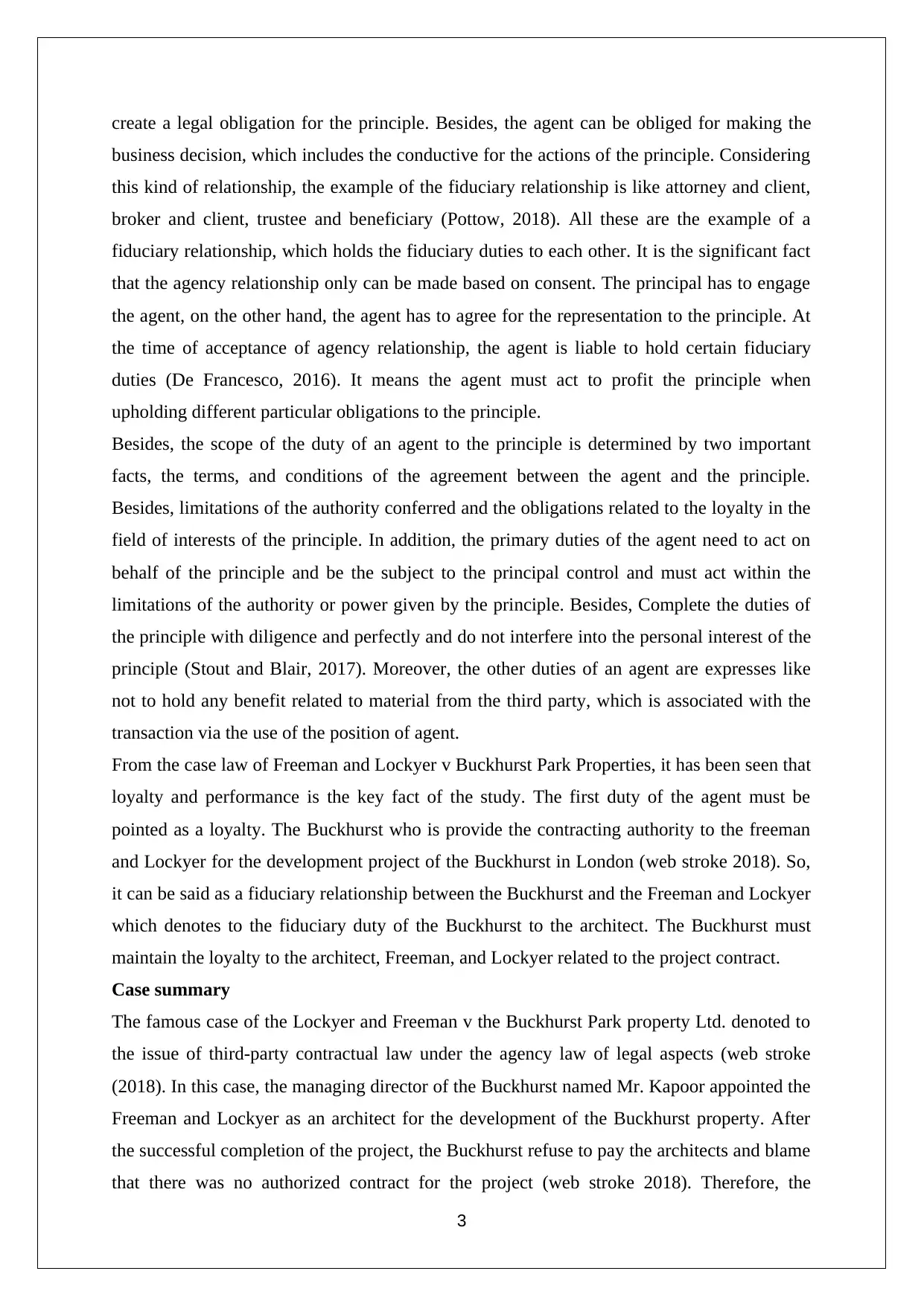
create a legal obligation for the principle. Besides, the agent can be obliged for making the
business decision, which includes the conductive for the actions of the principle. Considering
this kind of relationship, the example of the fiduciary relationship is like attorney and client,
broker and client, trustee and beneficiary (Pottow, 2018). All these are the example of a
fiduciary relationship, which holds the fiduciary duties to each other. It is the significant fact
that the agency relationship only can be made based on consent. The principal has to engage
the agent, on the other hand, the agent has to agree for the representation to the principle. At
the time of acceptance of agency relationship, the agent is liable to hold certain fiduciary
duties (De Francesco, 2016). It means the agent must act to profit the principle when
upholding different particular obligations to the principle.
Besides, the scope of the duty of an agent to the principle is determined by two important
facts, the terms, and conditions of the agreement between the agent and the principle.
Besides, limitations of the authority conferred and the obligations related to the loyalty in the
field of interests of the principle. In addition, the primary duties of the agent need to act on
behalf of the principle and be the subject to the principal control and must act within the
limitations of the authority or power given by the principle. Besides, Complete the duties of
the principle with diligence and perfectly and do not interfere into the personal interest of the
principle (Stout and Blair, 2017). Moreover, the other duties of an agent are expresses like
not to hold any benefit related to material from the third party, which is associated with the
transaction via the use of the position of agent.
From the case law of Freeman and Lockyer v Buckhurst Park Properties, it has been seen that
loyalty and performance is the key fact of the study. The first duty of the agent must be
pointed as a loyalty. The Buckhurst who is provide the contracting authority to the freeman
and Lockyer for the development project of the Buckhurst in London (web stroke 2018). So,
it can be said as a fiduciary relationship between the Buckhurst and the Freeman and Lockyer
which denotes to the fiduciary duty of the Buckhurst to the architect. The Buckhurst must
maintain the loyalty to the architect, Freeman, and Lockyer related to the project contract.
Case summary
The famous case of the Lockyer and Freeman v the Buckhurst Park property Ltd. denoted to
the issue of third-party contractual law under the agency law of legal aspects (web stroke
(2018). In this case, the managing director of the Buckhurst named Mr. Kapoor appointed the
Freeman and Lockyer as an architect for the development of the Buckhurst property. After
the successful completion of the project, the Buckhurst refuse to pay the architects and blame
that there was no authorized contract for the project (web stroke 2018). Therefore, the
3
business decision, which includes the conductive for the actions of the principle. Considering
this kind of relationship, the example of the fiduciary relationship is like attorney and client,
broker and client, trustee and beneficiary (Pottow, 2018). All these are the example of a
fiduciary relationship, which holds the fiduciary duties to each other. It is the significant fact
that the agency relationship only can be made based on consent. The principal has to engage
the agent, on the other hand, the agent has to agree for the representation to the principle. At
the time of acceptance of agency relationship, the agent is liable to hold certain fiduciary
duties (De Francesco, 2016). It means the agent must act to profit the principle when
upholding different particular obligations to the principle.
Besides, the scope of the duty of an agent to the principle is determined by two important
facts, the terms, and conditions of the agreement between the agent and the principle.
Besides, limitations of the authority conferred and the obligations related to the loyalty in the
field of interests of the principle. In addition, the primary duties of the agent need to act on
behalf of the principle and be the subject to the principal control and must act within the
limitations of the authority or power given by the principle. Besides, Complete the duties of
the principle with diligence and perfectly and do not interfere into the personal interest of the
principle (Stout and Blair, 2017). Moreover, the other duties of an agent are expresses like
not to hold any benefit related to material from the third party, which is associated with the
transaction via the use of the position of agent.
From the case law of Freeman and Lockyer v Buckhurst Park Properties, it has been seen that
loyalty and performance is the key fact of the study. The first duty of the agent must be
pointed as a loyalty. The Buckhurst who is provide the contracting authority to the freeman
and Lockyer for the development project of the Buckhurst in London (web stroke 2018). So,
it can be said as a fiduciary relationship between the Buckhurst and the Freeman and Lockyer
which denotes to the fiduciary duty of the Buckhurst to the architect. The Buckhurst must
maintain the loyalty to the architect, Freeman, and Lockyer related to the project contract.
Case summary
The famous case of the Lockyer and Freeman v the Buckhurst Park property Ltd. denoted to
the issue of third-party contractual law under the agency law of legal aspects (web stroke
(2018). In this case, the managing director of the Buckhurst named Mr. Kapoor appointed the
Freeman and Lockyer as an architect for the development of the Buckhurst property. After
the successful completion of the project, the Buckhurst refuse to pay the architects and blame
that there was no authorized contract for the project (web stroke 2018). Therefore, the
3
Paraphrase This Document
Need a fresh take? Get an instant paraphrase of this document with our AI Paraphraser
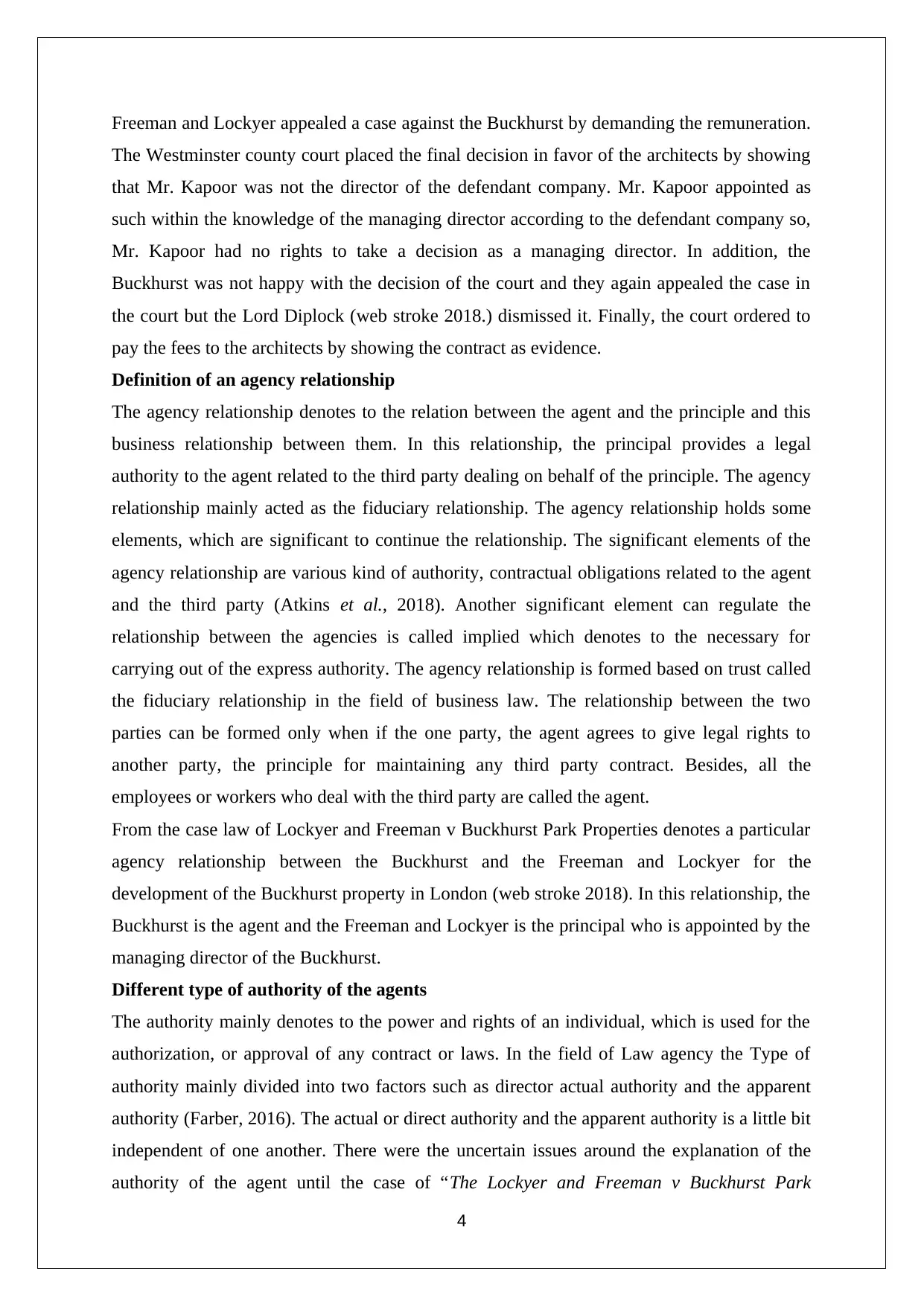
Freeman and Lockyer appealed a case against the Buckhurst by demanding the remuneration.
The Westminster county court placed the final decision in favor of the architects by showing
that Mr. Kapoor was not the director of the defendant company. Mr. Kapoor appointed as
such within the knowledge of the managing director according to the defendant company so,
Mr. Kapoor had no rights to take a decision as a managing director. In addition, the
Buckhurst was not happy with the decision of the court and they again appealed the case in
the court but the Lord Diplock (web stroke 2018.) dismissed it. Finally, the court ordered to
pay the fees to the architects by showing the contract as evidence.
Definition of an agency relationship
The agency relationship denotes to the relation between the agent and the principle and this
business relationship between them. In this relationship, the principal provides a legal
authority to the agent related to the third party dealing on behalf of the principle. The agency
relationship mainly acted as the fiduciary relationship. The agency relationship holds some
elements, which are significant to continue the relationship. The significant elements of the
agency relationship are various kind of authority, contractual obligations related to the agent
and the third party (Atkins et al., 2018). Another significant element can regulate the
relationship between the agencies is called implied which denotes to the necessary for
carrying out of the express authority. The agency relationship is formed based on trust called
the fiduciary relationship in the field of business law. The relationship between the two
parties can be formed only when if the one party, the agent agrees to give legal rights to
another party, the principle for maintaining any third party contract. Besides, all the
employees or workers who deal with the third party are called the agent.
From the case law of Lockyer and Freeman v Buckhurst Park Properties denotes a particular
agency relationship between the Buckhurst and the Freeman and Lockyer for the
development of the Buckhurst property in London (web stroke 2018). In this relationship, the
Buckhurst is the agent and the Freeman and Lockyer is the principal who is appointed by the
managing director of the Buckhurst.
Different type of authority of the agents
The authority mainly denotes to the power and rights of an individual, which is used for the
authorization, or approval of any contract or laws. In the field of Law agency the Type of
authority mainly divided into two factors such as director actual authority and the apparent
authority (Farber, 2016). The actual or direct authority and the apparent authority is a little bit
independent of one another. There were the uncertain issues around the explanation of the
authority of the agent until the case of “The Lockyer and Freeman v Buckhurst Park
4
The Westminster county court placed the final decision in favor of the architects by showing
that Mr. Kapoor was not the director of the defendant company. Mr. Kapoor appointed as
such within the knowledge of the managing director according to the defendant company so,
Mr. Kapoor had no rights to take a decision as a managing director. In addition, the
Buckhurst was not happy with the decision of the court and they again appealed the case in
the court but the Lord Diplock (web stroke 2018.) dismissed it. Finally, the court ordered to
pay the fees to the architects by showing the contract as evidence.
Definition of an agency relationship
The agency relationship denotes to the relation between the agent and the principle and this
business relationship between them. In this relationship, the principal provides a legal
authority to the agent related to the third party dealing on behalf of the principle. The agency
relationship mainly acted as the fiduciary relationship. The agency relationship holds some
elements, which are significant to continue the relationship. The significant elements of the
agency relationship are various kind of authority, contractual obligations related to the agent
and the third party (Atkins et al., 2018). Another significant element can regulate the
relationship between the agencies is called implied which denotes to the necessary for
carrying out of the express authority. The agency relationship is formed based on trust called
the fiduciary relationship in the field of business law. The relationship between the two
parties can be formed only when if the one party, the agent agrees to give legal rights to
another party, the principle for maintaining any third party contract. Besides, all the
employees or workers who deal with the third party are called the agent.
From the case law of Lockyer and Freeman v Buckhurst Park Properties denotes a particular
agency relationship between the Buckhurst and the Freeman and Lockyer for the
development of the Buckhurst property in London (web stroke 2018). In this relationship, the
Buckhurst is the agent and the Freeman and Lockyer is the principal who is appointed by the
managing director of the Buckhurst.
Different type of authority of the agents
The authority mainly denotes to the power and rights of an individual, which is used for the
authorization, or approval of any contract or laws. In the field of Law agency the Type of
authority mainly divided into two factors such as director actual authority and the apparent
authority (Farber, 2016). The actual or direct authority and the apparent authority is a little bit
independent of one another. There were the uncertain issues around the explanation of the
authority of the agent until the case of “The Lockyer and Freeman v Buckhurst Park
4
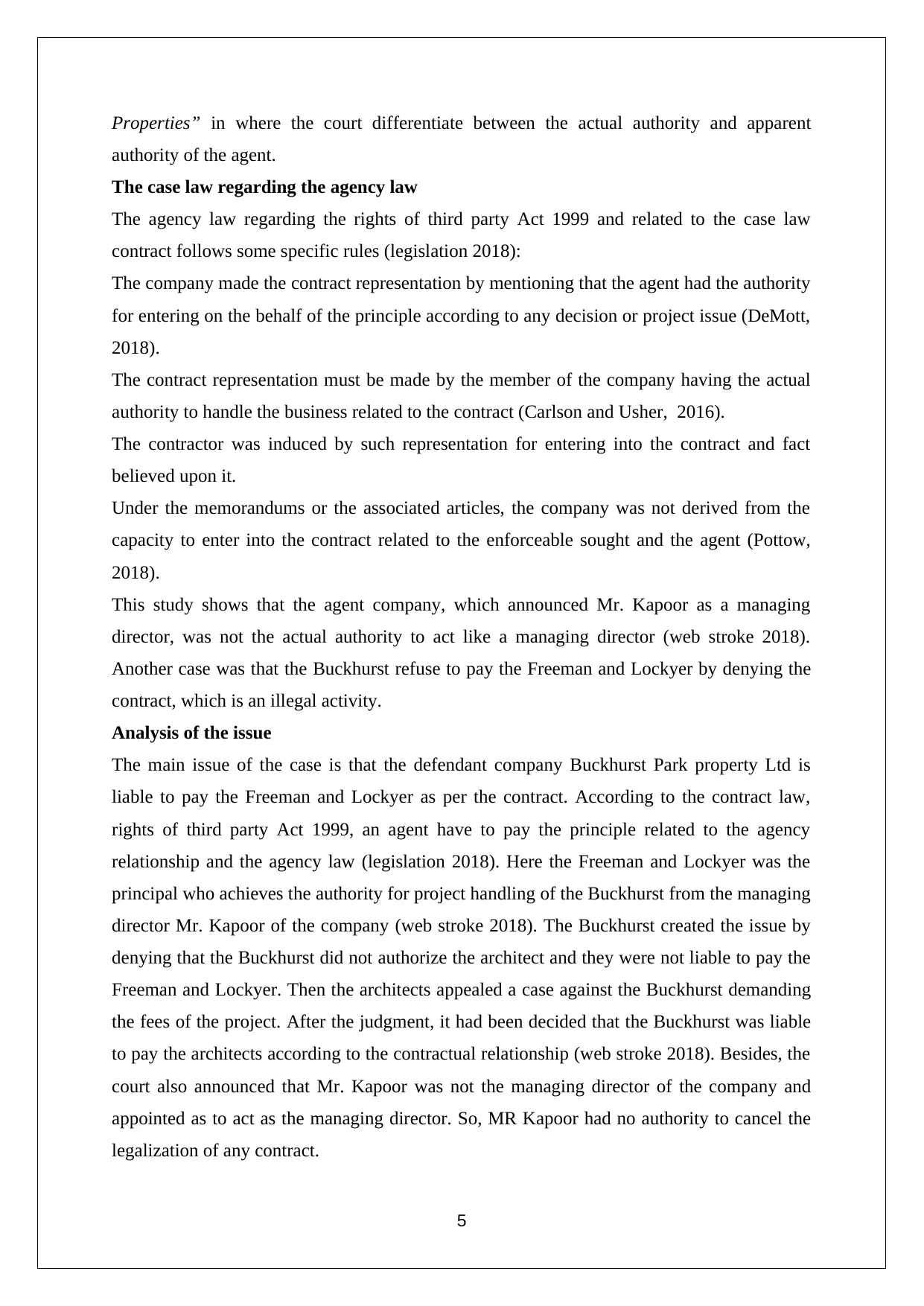
Properties” in where the court differentiate between the actual authority and apparent
authority of the agent.
The case law regarding the agency law
The agency law regarding the rights of third party Act 1999 and related to the case law
contract follows some specific rules (legislation 2018):
The company made the contract representation by mentioning that the agent had the authority
for entering on the behalf of the principle according to any decision or project issue (DeMott,
2018).
The contract representation must be made by the member of the company having the actual
authority to handle the business related to the contract (Carlson and Usher, 2016).
The contractor was induced by such representation for entering into the contract and fact
believed upon it.
Under the memorandums or the associated articles, the company was not derived from the
capacity to enter into the contract related to the enforceable sought and the agent (Pottow,
2018).
This study shows that the agent company, which announced Mr. Kapoor as a managing
director, was not the actual authority to act like a managing director (web stroke 2018).
Another case was that the Buckhurst refuse to pay the Freeman and Lockyer by denying the
contract, which is an illegal activity.
Analysis of the issue
The main issue of the case is that the defendant company Buckhurst Park property Ltd is
liable to pay the Freeman and Lockyer as per the contract. According to the contract law,
rights of third party Act 1999, an agent have to pay the principle related to the agency
relationship and the agency law (legislation 2018). Here the Freeman and Lockyer was the
principal who achieves the authority for project handling of the Buckhurst from the managing
director Mr. Kapoor of the company (web stroke 2018). The Buckhurst created the issue by
denying that the Buckhurst did not authorize the architect and they were not liable to pay the
Freeman and Lockyer. Then the architects appealed a case against the Buckhurst demanding
the fees of the project. After the judgment, it had been decided that the Buckhurst was liable
to pay the architects according to the contractual relationship (web stroke 2018). Besides, the
court also announced that Mr. Kapoor was not the managing director of the company and
appointed as to act as the managing director. So, MR Kapoor had no authority to cancel the
legalization of any contract.
5
authority of the agent.
The case law regarding the agency law
The agency law regarding the rights of third party Act 1999 and related to the case law
contract follows some specific rules (legislation 2018):
The company made the contract representation by mentioning that the agent had the authority
for entering on the behalf of the principle according to any decision or project issue (DeMott,
2018).
The contract representation must be made by the member of the company having the actual
authority to handle the business related to the contract (Carlson and Usher, 2016).
The contractor was induced by such representation for entering into the contract and fact
believed upon it.
Under the memorandums or the associated articles, the company was not derived from the
capacity to enter into the contract related to the enforceable sought and the agent (Pottow,
2018).
This study shows that the agent company, which announced Mr. Kapoor as a managing
director, was not the actual authority to act like a managing director (web stroke 2018).
Another case was that the Buckhurst refuse to pay the Freeman and Lockyer by denying the
contract, which is an illegal activity.
Analysis of the issue
The main issue of the case is that the defendant company Buckhurst Park property Ltd is
liable to pay the Freeman and Lockyer as per the contract. According to the contract law,
rights of third party Act 1999, an agent have to pay the principle related to the agency
relationship and the agency law (legislation 2018). Here the Freeman and Lockyer was the
principal who achieves the authority for project handling of the Buckhurst from the managing
director Mr. Kapoor of the company (web stroke 2018). The Buckhurst created the issue by
denying that the Buckhurst did not authorize the architect and they were not liable to pay the
Freeman and Lockyer. Then the architects appealed a case against the Buckhurst demanding
the fees of the project. After the judgment, it had been decided that the Buckhurst was liable
to pay the architects according to the contractual relationship (web stroke 2018). Besides, the
court also announced that Mr. Kapoor was not the managing director of the company and
appointed as to act as the managing director. So, MR Kapoor had no authority to cancel the
legalization of any contract.
5
⊘ This is a preview!⊘
Do you want full access?
Subscribe today to unlock all pages.

Trusted by 1+ million students worldwide
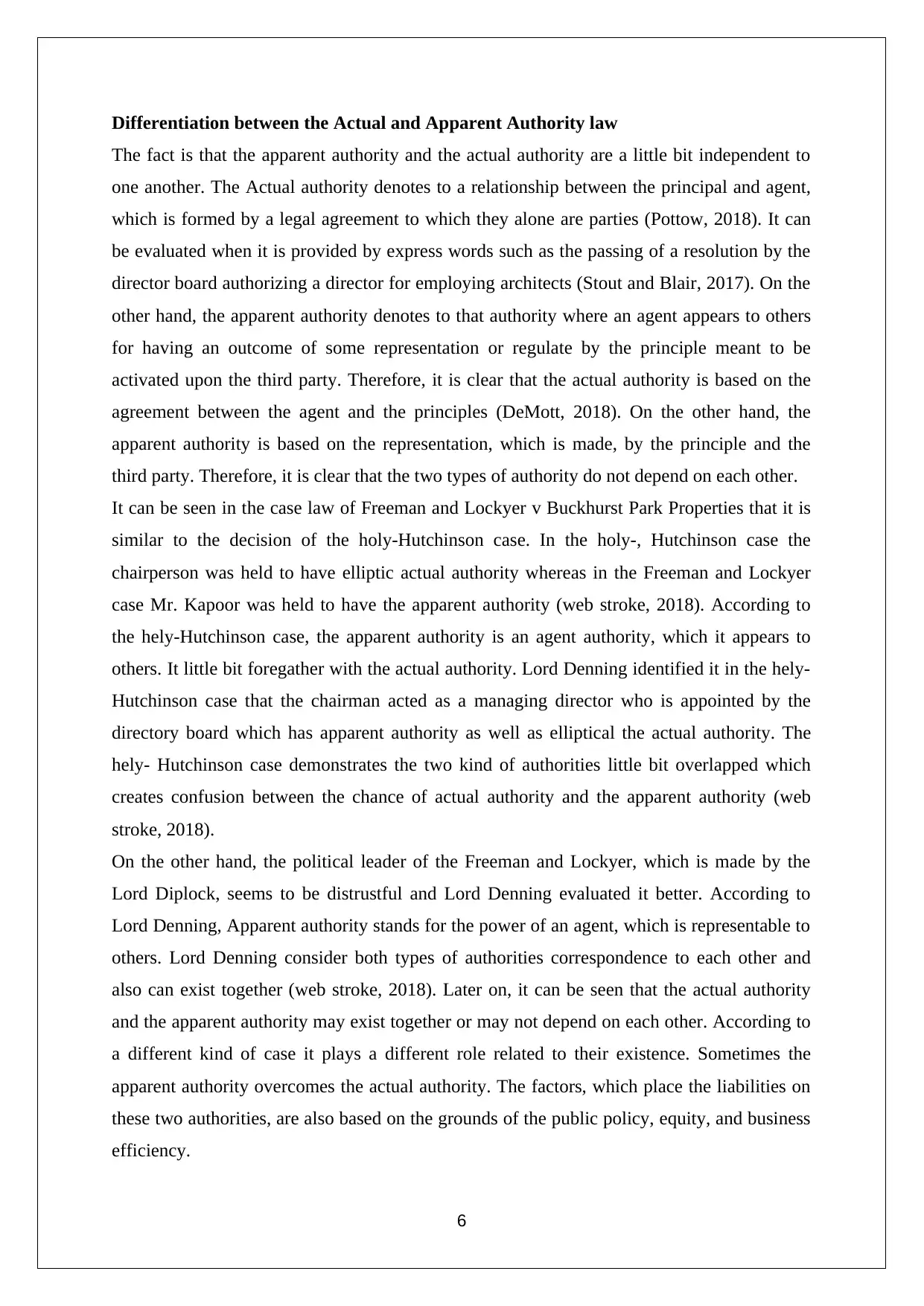
Differentiation between the Actual and Apparent Authority law
The fact is that the apparent authority and the actual authority are a little bit independent to
one another. The Actual authority denotes to a relationship between the principal and agent,
which is formed by a legal agreement to which they alone are parties (Pottow, 2018). It can
be evaluated when it is provided by express words such as the passing of a resolution by the
director board authorizing a director for employing architects (Stout and Blair, 2017). On the
other hand, the apparent authority denotes to that authority where an agent appears to others
for having an outcome of some representation or regulate by the principle meant to be
activated upon the third party. Therefore, it is clear that the actual authority is based on the
agreement between the agent and the principles (DeMott, 2018). On the other hand, the
apparent authority is based on the representation, which is made, by the principle and the
third party. Therefore, it is clear that the two types of authority do not depend on each other.
It can be seen in the case law of Freeman and Lockyer v Buckhurst Park Properties that it is
similar to the decision of the holy-Hutchinson case. In the holy-, Hutchinson case the
chairperson was held to have elliptic actual authority whereas in the Freeman and Lockyer
case Mr. Kapoor was held to have the apparent authority (web stroke, 2018). According to
the hely-Hutchinson case, the apparent authority is an agent authority, which it appears to
others. It little bit foregather with the actual authority. Lord Denning identified it in the hely-
Hutchinson case that the chairman acted as a managing director who is appointed by the
directory board which has apparent authority as well as elliptical the actual authority. The
hely- Hutchinson case demonstrates the two kind of authorities little bit overlapped which
creates confusion between the chance of actual authority and the apparent authority (web
stroke, 2018).
On the other hand, the political leader of the Freeman and Lockyer, which is made by the
Lord Diplock, seems to be distrustful and Lord Denning evaluated it better. According to
Lord Denning, Apparent authority stands for the power of an agent, which is representable to
others. Lord Denning consider both types of authorities correspondence to each other and
also can exist together (web stroke, 2018). Later on, it can be seen that the actual authority
and the apparent authority may exist together or may not depend on each other. According to
a different kind of case it plays a different role related to their existence. Sometimes the
apparent authority overcomes the actual authority. The factors, which place the liabilities on
these two authorities, are also based on the grounds of the public policy, equity, and business
efficiency.
6
The fact is that the apparent authority and the actual authority are a little bit independent to
one another. The Actual authority denotes to a relationship between the principal and agent,
which is formed by a legal agreement to which they alone are parties (Pottow, 2018). It can
be evaluated when it is provided by express words such as the passing of a resolution by the
director board authorizing a director for employing architects (Stout and Blair, 2017). On the
other hand, the apparent authority denotes to that authority where an agent appears to others
for having an outcome of some representation or regulate by the principle meant to be
activated upon the third party. Therefore, it is clear that the actual authority is based on the
agreement between the agent and the principles (DeMott, 2018). On the other hand, the
apparent authority is based on the representation, which is made, by the principle and the
third party. Therefore, it is clear that the two types of authority do not depend on each other.
It can be seen in the case law of Freeman and Lockyer v Buckhurst Park Properties that it is
similar to the decision of the holy-Hutchinson case. In the holy-, Hutchinson case the
chairperson was held to have elliptic actual authority whereas in the Freeman and Lockyer
case Mr. Kapoor was held to have the apparent authority (web stroke, 2018). According to
the hely-Hutchinson case, the apparent authority is an agent authority, which it appears to
others. It little bit foregather with the actual authority. Lord Denning identified it in the hely-
Hutchinson case that the chairman acted as a managing director who is appointed by the
directory board which has apparent authority as well as elliptical the actual authority. The
hely- Hutchinson case demonstrates the two kind of authorities little bit overlapped which
creates confusion between the chance of actual authority and the apparent authority (web
stroke, 2018).
On the other hand, the political leader of the Freeman and Lockyer, which is made by the
Lord Diplock, seems to be distrustful and Lord Denning evaluated it better. According to
Lord Denning, Apparent authority stands for the power of an agent, which is representable to
others. Lord Denning consider both types of authorities correspondence to each other and
also can exist together (web stroke, 2018). Later on, it can be seen that the actual authority
and the apparent authority may exist together or may not depend on each other. According to
a different kind of case it plays a different role related to their existence. Sometimes the
apparent authority overcomes the actual authority. The factors, which place the liabilities on
these two authorities, are also based on the grounds of the public policy, equity, and business
efficiency.
6
Paraphrase This Document
Need a fresh take? Get an instant paraphrase of this document with our AI Paraphraser
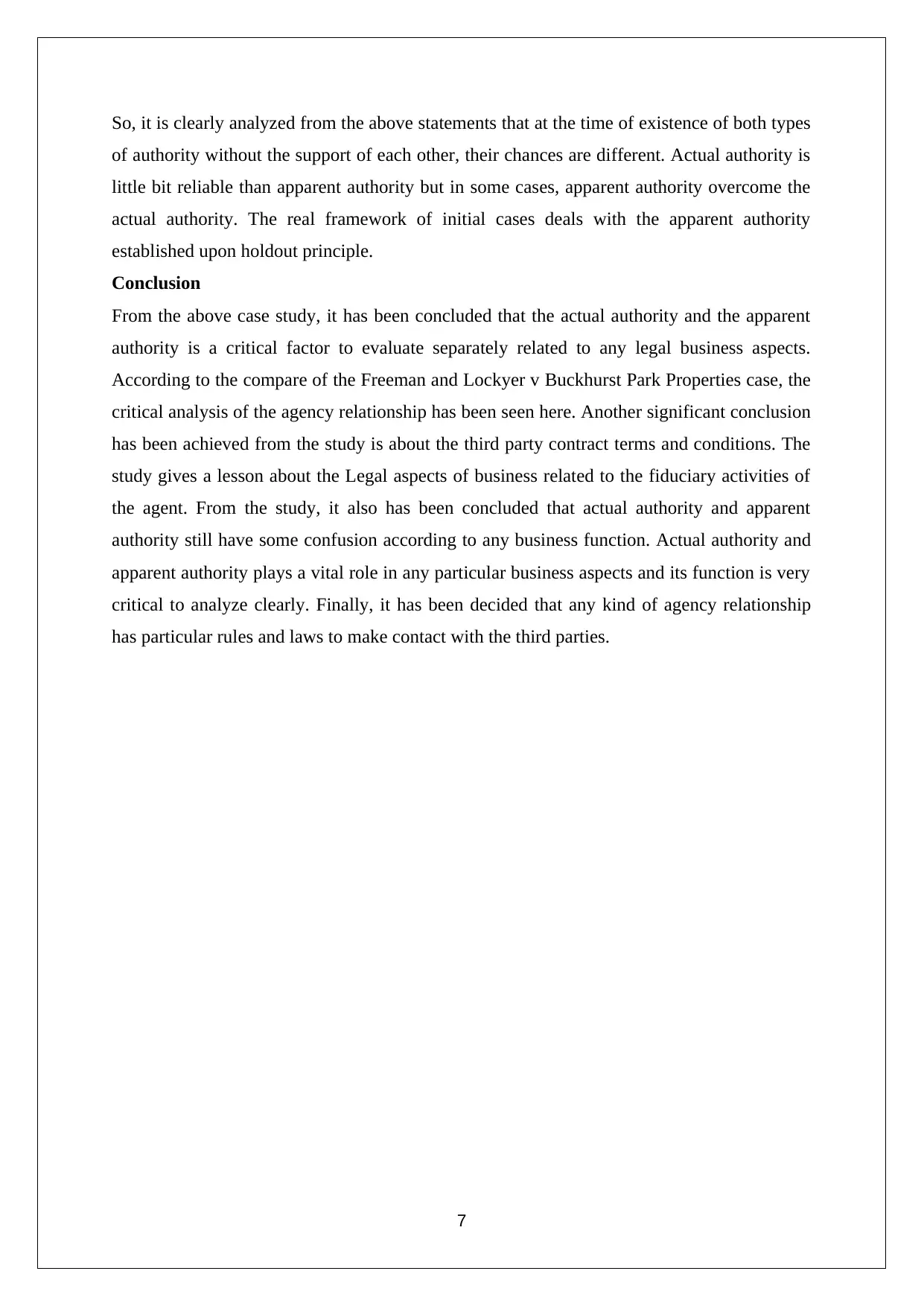
So, it is clearly analyzed from the above statements that at the time of existence of both types
of authority without the support of each other, their chances are different. Actual authority is
little bit reliable than apparent authority but in some cases, apparent authority overcome the
actual authority. The real framework of initial cases deals with the apparent authority
established upon holdout principle.
Conclusion
From the above case study, it has been concluded that the actual authority and the apparent
authority is a critical factor to evaluate separately related to any legal business aspects.
According to the compare of the Freeman and Lockyer v Buckhurst Park Properties case, the
critical analysis of the agency relationship has been seen here. Another significant conclusion
has been achieved from the study is about the third party contract terms and conditions. The
study gives a lesson about the Legal aspects of business related to the fiduciary activities of
the agent. From the study, it also has been concluded that actual authority and apparent
authority still have some confusion according to any business function. Actual authority and
apparent authority plays a vital role in any particular business aspects and its function is very
critical to analyze clearly. Finally, it has been decided that any kind of agency relationship
has particular rules and laws to make contact with the third parties.
7
of authority without the support of each other, their chances are different. Actual authority is
little bit reliable than apparent authority but in some cases, apparent authority overcome the
actual authority. The real framework of initial cases deals with the apparent authority
established upon holdout principle.
Conclusion
From the above case study, it has been concluded that the actual authority and the apparent
authority is a critical factor to evaluate separately related to any legal business aspects.
According to the compare of the Freeman and Lockyer v Buckhurst Park Properties case, the
critical analysis of the agency relationship has been seen here. Another significant conclusion
has been achieved from the study is about the third party contract terms and conditions. The
study gives a lesson about the Legal aspects of business related to the fiduciary activities of
the agent. From the study, it also has been concluded that actual authority and apparent
authority still have some confusion according to any business function. Actual authority and
apparent authority plays a vital role in any particular business aspects and its function is very
critical to analyze clearly. Finally, it has been decided that any kind of agency relationship
has particular rules and laws to make contact with the third parties.
7
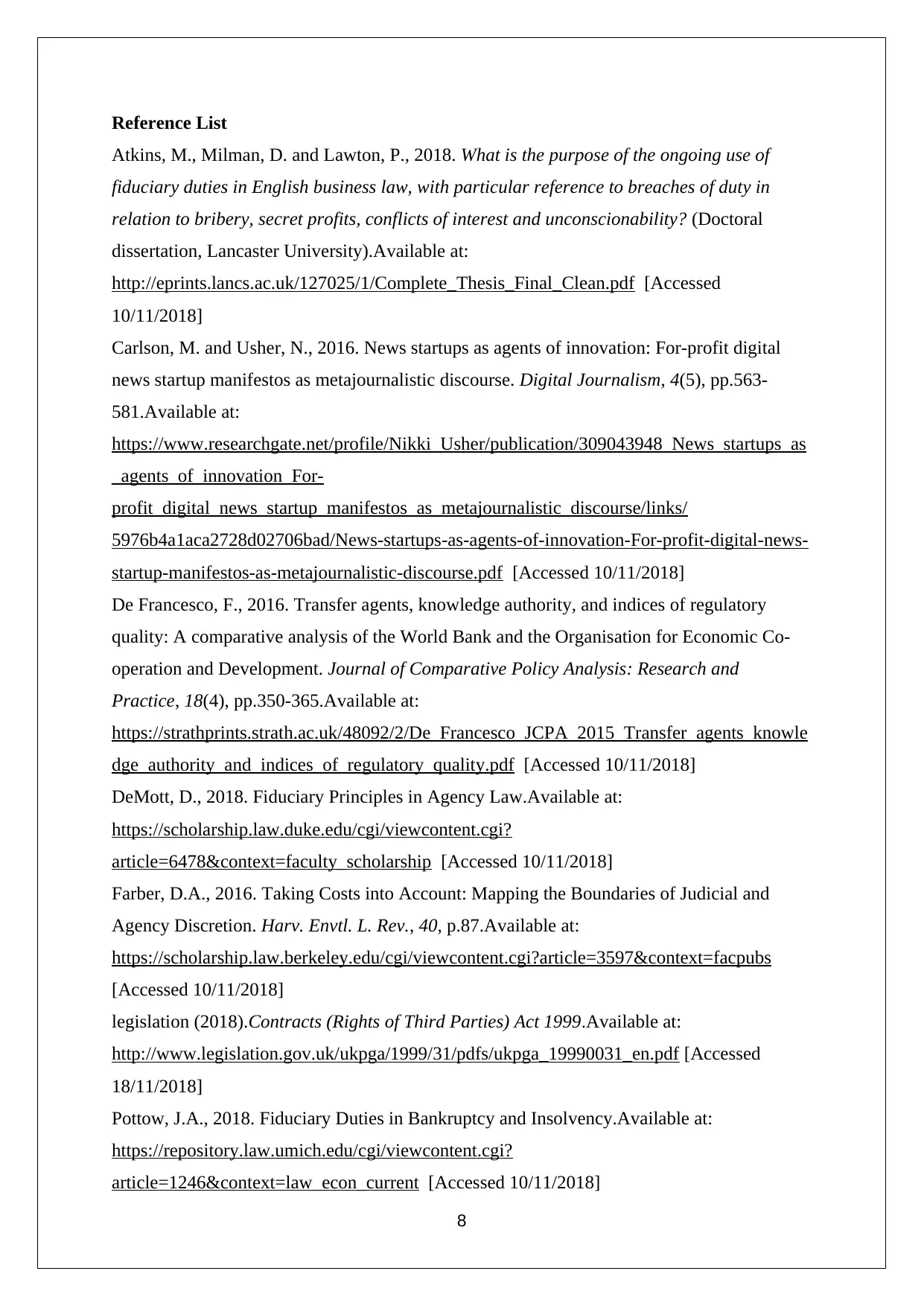
Reference List
Atkins, M., Milman, D. and Lawton, P., 2018. What is the purpose of the ongoing use of
fiduciary duties in English business law, with particular reference to breaches of duty in
relation to bribery, secret profits, conflicts of interest and unconscionability? (Doctoral
dissertation, Lancaster University).Available at:
http://eprints.lancs.ac.uk/127025/1/Complete_Thesis_Final_Clean.pdf [Accessed
10/11/2018]
Carlson, M. and Usher, N., 2016. News startups as agents of innovation: For-profit digital
news startup manifestos as metajournalistic discourse. Digital Journalism, 4(5), pp.563-
581.Available at:
https://www.researchgate.net/profile/Nikki_Usher/publication/309043948_News_startups_as
_agents_of_innovation_For-
profit_digital_news_startup_manifestos_as_metajournalistic_discourse/links/
5976b4a1aca2728d02706bad/News-startups-as-agents-of-innovation-For-profit-digital-news-
startup-manifestos-as-metajournalistic-discourse.pdf [Accessed 10/11/2018]
De Francesco, F., 2016. Transfer agents, knowledge authority, and indices of regulatory
quality: A comparative analysis of the World Bank and the Organisation for Economic Co-
operation and Development. Journal of Comparative Policy Analysis: Research and
Practice, 18(4), pp.350-365.Available at:
https://strathprints.strath.ac.uk/48092/2/De_Francesco_JCPA_2015_Transfer_agents_knowle
dge_authority_and_indices_of_regulatory_quality.pdf [Accessed 10/11/2018]
DeMott, D., 2018. Fiduciary Principles in Agency Law.Available at:
https://scholarship.law.duke.edu/cgi/viewcontent.cgi?
article=6478&context=faculty_scholarship [Accessed 10/11/2018]
Farber, D.A., 2016. Taking Costs into Account: Mapping the Boundaries of Judicial and
Agency Discretion. Harv. Envtl. L. Rev., 40, p.87.Available at:
https://scholarship.law.berkeley.edu/cgi/viewcontent.cgi?article=3597&context=facpubs
[Accessed 10/11/2018]
legislation (2018).Contracts (Rights of Third Parties) Act 1999.Available at:
http://www.legislation.gov.uk/ukpga/1999/31/pdfs/ukpga_19990031_en.pdf [Accessed
18/11/2018]
Pottow, J.A., 2018. Fiduciary Duties in Bankruptcy and Insolvency.Available at:
https://repository.law.umich.edu/cgi/viewcontent.cgi?
article=1246&context=law_econ_current [Accessed 10/11/2018]
8
Atkins, M., Milman, D. and Lawton, P., 2018. What is the purpose of the ongoing use of
fiduciary duties in English business law, with particular reference to breaches of duty in
relation to bribery, secret profits, conflicts of interest and unconscionability? (Doctoral
dissertation, Lancaster University).Available at:
http://eprints.lancs.ac.uk/127025/1/Complete_Thesis_Final_Clean.pdf [Accessed
10/11/2018]
Carlson, M. and Usher, N., 2016. News startups as agents of innovation: For-profit digital
news startup manifestos as metajournalistic discourse. Digital Journalism, 4(5), pp.563-
581.Available at:
https://www.researchgate.net/profile/Nikki_Usher/publication/309043948_News_startups_as
_agents_of_innovation_For-
profit_digital_news_startup_manifestos_as_metajournalistic_discourse/links/
5976b4a1aca2728d02706bad/News-startups-as-agents-of-innovation-For-profit-digital-news-
startup-manifestos-as-metajournalistic-discourse.pdf [Accessed 10/11/2018]
De Francesco, F., 2016. Transfer agents, knowledge authority, and indices of regulatory
quality: A comparative analysis of the World Bank and the Organisation for Economic Co-
operation and Development. Journal of Comparative Policy Analysis: Research and
Practice, 18(4), pp.350-365.Available at:
https://strathprints.strath.ac.uk/48092/2/De_Francesco_JCPA_2015_Transfer_agents_knowle
dge_authority_and_indices_of_regulatory_quality.pdf [Accessed 10/11/2018]
DeMott, D., 2018. Fiduciary Principles in Agency Law.Available at:
https://scholarship.law.duke.edu/cgi/viewcontent.cgi?
article=6478&context=faculty_scholarship [Accessed 10/11/2018]
Farber, D.A., 2016. Taking Costs into Account: Mapping the Boundaries of Judicial and
Agency Discretion. Harv. Envtl. L. Rev., 40, p.87.Available at:
https://scholarship.law.berkeley.edu/cgi/viewcontent.cgi?article=3597&context=facpubs
[Accessed 10/11/2018]
legislation (2018).Contracts (Rights of Third Parties) Act 1999.Available at:
http://www.legislation.gov.uk/ukpga/1999/31/pdfs/ukpga_19990031_en.pdf [Accessed
18/11/2018]
Pottow, J.A., 2018. Fiduciary Duties in Bankruptcy and Insolvency.Available at:
https://repository.law.umich.edu/cgi/viewcontent.cgi?
article=1246&context=law_econ_current [Accessed 10/11/2018]
8
⊘ This is a preview!⊘
Do you want full access?
Subscribe today to unlock all pages.

Trusted by 1+ million students worldwide
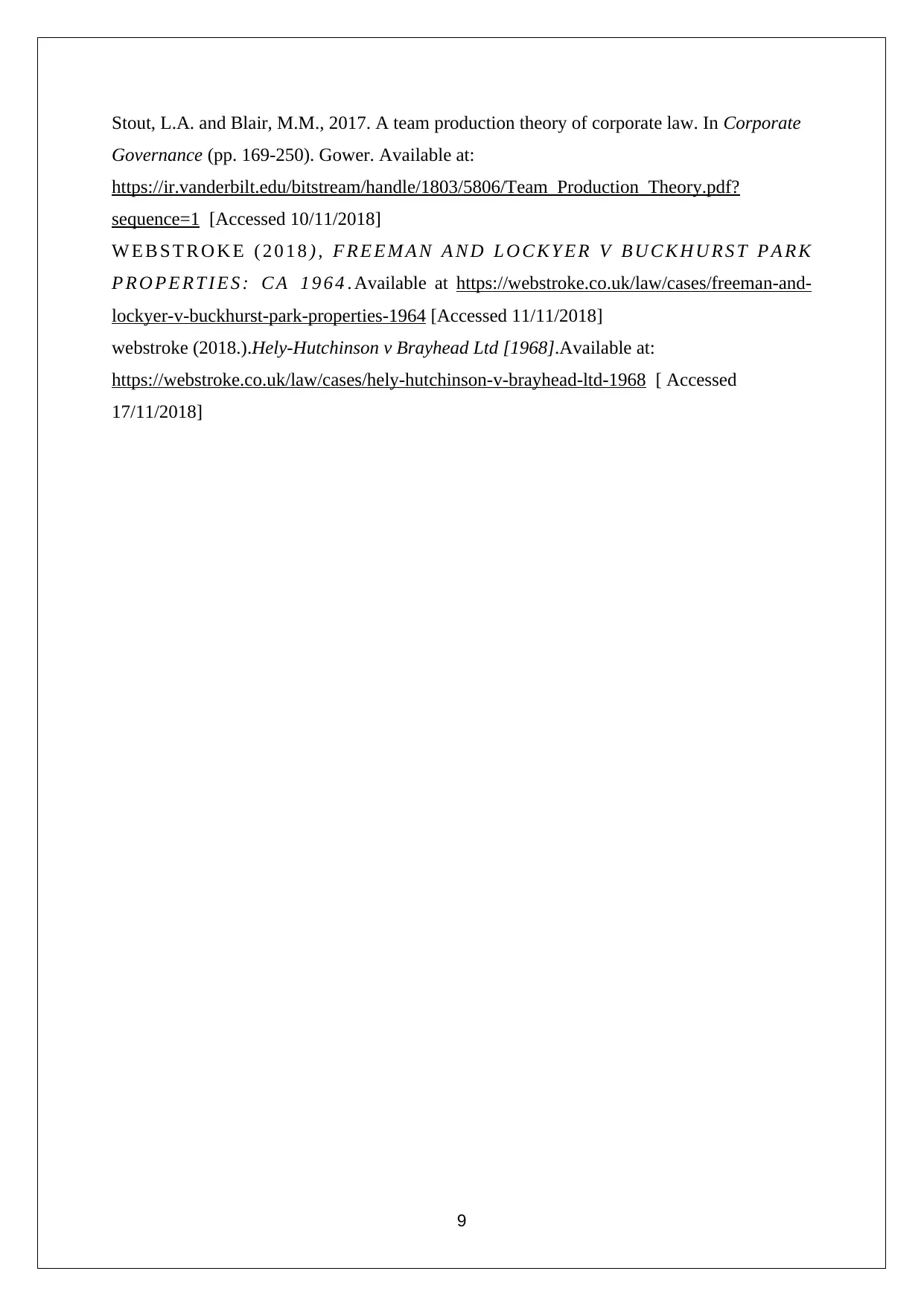
Stout, L.A. and Blair, M.M., 2017. A team production theory of corporate law. In Corporate
Governance (pp. 169-250). Gower. Available at:
https://ir.vanderbilt.edu/bitstream/handle/1803/5806/Team_Production_Theory.pdf?
sequence=1 [Accessed 10/11/2018]
W E B S T R O K E ( 2 0 1 8 ) , F R E E M A N A N D L O C K Y E R V B U C K H U R S T P A R K
P R O P E R T I E S : C A 1 9 6 4 . Available at https://webstroke.co.uk/law/cases/freeman-and-
lockyer-v-buckhurst-park-properties-1964 [Accessed 11/11/2018]
webstroke (2018.).Hely-Hutchinson v Brayhead Ltd [1968].Available at:
https://webstroke.co.uk/law/cases/hely-hutchinson-v-brayhead-ltd-1968 [ Accessed
17/11/2018]
9
Governance (pp. 169-250). Gower. Available at:
https://ir.vanderbilt.edu/bitstream/handle/1803/5806/Team_Production_Theory.pdf?
sequence=1 [Accessed 10/11/2018]
W E B S T R O K E ( 2 0 1 8 ) , F R E E M A N A N D L O C K Y E R V B U C K H U R S T P A R K
P R O P E R T I E S : C A 1 9 6 4 . Available at https://webstroke.co.uk/law/cases/freeman-and-
lockyer-v-buckhurst-park-properties-1964 [Accessed 11/11/2018]
webstroke (2018.).Hely-Hutchinson v Brayhead Ltd [1968].Available at:
https://webstroke.co.uk/law/cases/hely-hutchinson-v-brayhead-ltd-1968 [ Accessed
17/11/2018]
9
1 out of 10
Related Documents
Your All-in-One AI-Powered Toolkit for Academic Success.
+13062052269
info@desklib.com
Available 24*7 on WhatsApp / Email
![[object Object]](/_next/static/media/star-bottom.7253800d.svg)
Unlock your academic potential
Copyright © 2020–2026 A2Z Services. All Rights Reserved. Developed and managed by ZUCOL.





